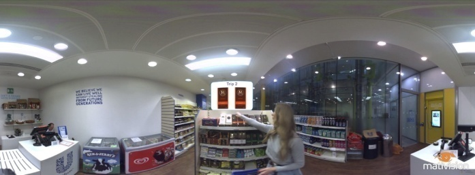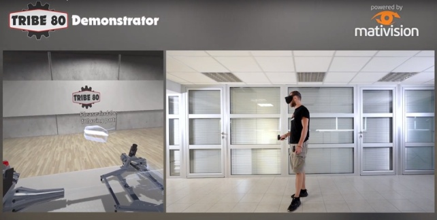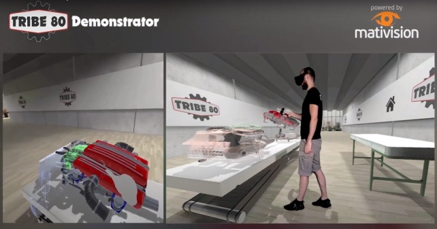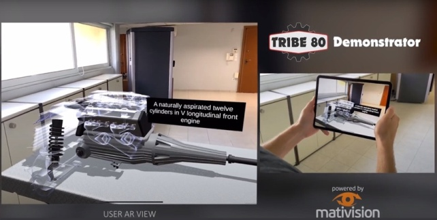
Joanna Tzima
QUESTION 1
First of all, lets learn what do we mean by Immersiveness?
Joanna Tzima: It is a fact that the technological developments of the last decades are constantly adding new terms and new digital tools that have an influence on our professional and personal life.
The term ‘Immersiveness’ (or otherwise ‘Immersion’) means that we are “transported” into a digital environment, a digital reality, allowing us to interact within it, as we would in real life. This digital reality allows us to create simulations of scenarios (real-life or not), get informed, trained, be evaluated, follow, and take part in collaborative environments. To achieve immersion the technologies of Virtual Reality (VR) and Augmented Reality (AR) are used.
QUESTION 2
What does Immersiveness have to do with HR?
Joanna Tzima: Immersive HR can offer the ability to remotely “experience” a shared reality which means that any new information, any new abilities can be assimilated in the least amount of time. Immersive HR negates the need for physical presence and the organizing of training groups. Immersive HR can allow users to experience a training session either in a synchronous collaborative environment with other trainees or at their own pace, in their own time. To be more specific, think of the next examples: An employee at an assembly line can be trained and start using new machinery without any need for access to any actual machinery. An employee can “walk” around any existing or to be built premises of the company, while tapping on info points without actually visiting the physical location of the company. The employee can be trained in real-life scenarios on how to manage customers by living, experiencing a simulation of the customer scenarios. Τhe employee can be trained on what are the appropriate actions to take in each situation that arises in regards to health & safety. And many more.
QUESTION 3
Isn’t it too soon to be talking about capabilities that sound “too good to be true”?
Joanna Tzima: Not at all. The technology of Virtual & Augmented Reality is already mature.
VR Applications with VR Devices are utilized in the field of medicine, flight simulations, automotive and military training, since the 1970s and respectively for AR, since the 1990s. In addition, the breadth of devices such as VR headsets, AR glasses, smartphones, tablets on the market is now more extensive than ever covering a broad range of prices. Apart from the obvious aspects of the time gained, productivity boosts inside a company, these solutions are now a must have. This is further highlighted by the new conditions imposed by the pandemic, with the need to remain fully operational in all areas such as sales, sampling, training, support no matter where we, our customers, partners, and colleagues are located. It is not a coincidence that the business world, on an international scale, uses and will do so even more intensely, in the days to come, the term Metaverse, which is nothing more than the remote synergy of partners through VR and AR environments.
QUESTION 4
How would we perceive Immersive HR in our day to day working life?
Joanna Tzima: Τhe adoption of Immersive HR does not require any change in the way an HR department works and operates at present. HR depts now have two new tools (VR & AR) at its disposal to transform information into an “experience”, which are always accessible, regardless of place and time and can be used to achieve goals faster, more efficiently and with less involved cost.
In every area of Human Resource there is potential and opportunity to use VR & AR such as:
- Adding an experiential and interactive element in the learning of procedures. VR&AR offers experiential onboarding, remote experiential training with the possibility of interactive tests and assessments, simulations of health & safety situations, remote support with hand-on experience and two-way communication.
- the ability to experience all the scenarios described above, regardless of where the user is based.
QUESTION 5
How would a Company adopt Immersive HR?
Joanna Tzima: Immersiveness is not something that is ready to use off-the-shelf but has to be implemented according to the needs, goals, infrastructure, internal structure, nature of the products or services of each company, organization, or group.
VR & AR experiences are designed and developed based on the specific needs and goals of the Human Resources department. These experiences can be developed in stages and be further expanded upon either in complexity or content.
In the past few years we see companies and multinational corporations shaping their own Immersive HR identities, with the aim of boosting their productivity, reducing their fixed costs, and ensuring their smooth operation regardless of any challenges that may arise.
To achieve HR Immersiveness, requires proper guidance and support by an Immersive Content Partner who – with his experience and knowledge, will offer the opportunity for any company to “adopt” Immersiveness gradually, effectively and always successfully. Mativision is such a partner, who takes the lead in designing and implementing the optimum Immersive HR experiences for each business.
Mativision Ltd. (www.mativision.com) is a UK based company active in the international market in the design and development of Immersive experiences since 2009. We have and maintain one of strongest portfolio of Immersive Media customers, with companies such as Unilever (UK), Samsung (UK), Chrysler (US), FOX (US), Vodafone (UK), Viacom (US), Warner (US & UK), Google (UK), Facebook (US), COACH (US), FIAT (IT), NHS (UK), MUSE (band, UK), SLASH (artist, US), Action Aid (GR), Novartis (GR). We have been awarded multiple international awards, with most recent the “Business Elite Award 2022” for “London’s Best VR and Immersive Content Technology Specialists “. We also play a primary role in the area of Immersive Content Platforms, through our participation in major UK 5G Trials for the Industry, entertainment, medical education and tourism.
We strongly believe that ‘experience is everything’ and thanks to our collaboration with FurtherUp – an innovation driven HR consulting company – we can offer to every company a first-hand experience of how immersive applications will transform the quality of the HR services.
Glossary of basic terms
Virtual reality (VR) places the experiencer in another location entirely. Whether that location has been generated by a computer or captured by video, it entirely occludes the experiencer’s natural surroundings.
Augmented reality (AR) is the overlaying of digitally-created content on top of the real world. Augmented reality allows the user to interact with both the real world and digital elements or augmentations.
Metaverse — from “meta” meaning “beyond” and the back-formation “verse” derived from “universe.” “Metaverse” means the sum total of spatialized Internet constructs including augmented and virtual realities, or “the sum of all virtual worlds.”
Immersive Learning is an experiential training methodology that uses Virtual Reality (VR) and Augmented Reality (AR) to simulate real-world scenarios and train employees in a safe and engaging immersive training environment.
Immersive experience pulls a viewer into another real or imagined world, enabling them to manipulate and interact with their environment. Immersive experiences use a blend of visuals, sound and technology to deliver unforgettable and engaging worlds.
Immersive — an experience that physically (and usually narratively) puts the audience on the same level in which the primary action of the experience occurs.
Digital twin is a digital representation of a real-world entity or system.





